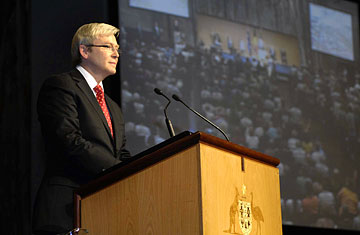
Australia's Prime Minister Kevin Rudd in Canberra makes a national apology to the forgotten Australians and former child migrants on Nov. 16, 2009
By 1947, Laurie Humphreys had already spent the majority of his short life in a Southampton orphanage in England. He was 13, and clearly remembers the BBC Home Service for schools announcing that Australia needed more migrants. "When the sisters asked who wanted to go to Australia, my hand was one of the first to go up," he recalls.
At the time, Humphreys believed Australia was the antidote to his dark, damp days in southern England. "We were told that there would be 14 hours of sunshine a day, and that we could ride a horse to school," he says. When he was one of the three chosen from his orphanage to go abroad, he was delighted.
Reality differed from Humphreys' expectations. His arrival in Bindoon, a small town in Western Australia, marked the end of his formal education. By 14, he was driving a truck to collect rocks and sand for a construction site where he and other child-migrant laborers were working. They were under the control of the Christian Brothers, an international Catholic congregation who are today notorious for their record of physically and sexually abusing orphans. "[The Brothers] were not afraid to use a belt. They wore these black robes that had a pocket on the inside — like a holster," remembers Humphreys. "And their belts would crack out like whips from under there."
Humphreys' was one of 7,000 British orphans shipped to Australia from 1930 to 1970 under the Child's Migrant Programme — a scheme designed to bring "good white stock" to populate Australia. Today, the people affected by the catastrophic policy are sometimes referred to in Australia as the "lost innocents." Though Humphrey's mother had died when he was 4, many child migrants who came to Australia during those years were children with single mothers who were forcibly removed from their homes. Some of their relatives had no knowledge that they had even left the country.
In a landmark apology on Nov. 16, Australian Prime Minister Kevin Rudd said sorry to the thousands of British child migrants for the nation's participation in a program that resulted in psychological and physical trauma to so many. He also included in the apology another group of 500,000 who are referred to as "forgotten Australians" — Australian children who were institutionalized in the 20th century because they were either orphans, children of single mothers, or belonged to abusive parents. Like the migrant children, many were also subjected to physical, sexual and emotional abuse under state care.
"We look back in shame at how those with power were allowed to abuse those who had none," Rudd told an audience of 1,000 in Canberra on Monday. "The truth is this is an ugly story, and its ugliness must be told without fear or favor if we are to confront fully the demons of our past. And in so doing, animate it once again the better angels of our human nature."
Opposition leader Malcolm Turnbull also joined Rudd in the ceremony. "Today we acknowledge that, already feeling alone, abandoned and left without love, many of you were beaten and abused, physically, sexually, mentally — treated like objects not people — leaving you to feel of even less worth," said Turnbull. Prime Minister Gordon Brown is due to make his own apology to the 130,000 British children sent from Britain to Canada, New Zealand, South Africa, Zimbabwe and Australia sometime next year.
This is the second prominent apology Rudd has made since he took office in a landslide election in 2007. The first was to the "stolen generation" — tens of thousands of Aboriginal and Torres Strait Island children who were removed from their families between 1869 to 1969 by the government.
Fifty-three-year-old Gabrielle Short, a forgotten Australian, described her ordeal at the Nazareth House, an orphanage in the southeastern town of Ballarat, to the Australia Associated Press (AAP). "If you wet the bed at the house, they'd rub your face into the sheets until it bled," Short said. "I try to explain it to my children now. If you were to read the story Oliver Twist, you take away the music and the happy bits, and that's what it was like." Two sisters, who were also in the care of the Nazareth House, but in Brisbane, told the AAP that there was no abuse that they hadn't endured. Christine Harms, one of the sisters, gave birth to a son when she was 15, who later died in state care at the age of 11. Harms said she was pleased with the government's recognition of her circumstances. "Mr. Rudd gave us hope and a bit of dignity back."
Humphreys described Rudd's speech on Monday as exceptional. "The word sorry doesn't mean much. You can't say sorry for a lost childhood," he says. "But you can acknowledge it, and that's what I needed."
